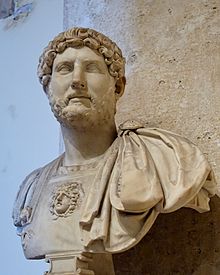
Back Hadrianus Afrikaans Hadrian (Kaiser) ALS ሄድሪየን Amharic Hadrián (emperador) AN هادريان Arabic هادريان ARZ Adrianu AST Adrian Azerbaijani هادریانوس (روم) AZB Hadrianus BAN
| Hadrian | |||||
|---|---|---|---|---|---|
| Emperor of the Roman Empire | |||||
 Marble bust of Hadrian. | |||||
| Reign | 10 August 117 – 10 July 138 (20 years, 334 days) | ||||
| Predecessor | Trajan | ||||
| Successor | Antoninus Pius | ||||
| Born | 24 January 76 Italica, Hispania | ||||
| Died | 10 July 138 (aged 62) Baiae | ||||
| Burial | Rome | ||||
| Spouse | Vibia Sabina | ||||
| Issue | Lucius Aelius Antoninus Pius (both adoptive) | ||||
| |||||
| Dynasty | Nervan-Antonian | ||||
| Father | Publius Aelius Hadrianus Afer | ||||
| Mother | Domitia Paulina | ||||
Hadrian (Publius Aelius Hadrianus,[1] 24 January 76 – 10 July 138) was Roman Emperor from 117 to 138.
He is well known for building Hadrian's Wall, which marked the northern limit of Roman territory in Britain. In Rome, he built the Pantheon, Castel Sant'Angelo (originally Hadrian's Tomb) and the Temple of Venus and Roma.[2]
In addition to being emperor, Hadrian was a humanist and a lover of Greek culture in all his tastes. Hadrian was the third of the so-called Five Good Emperors.[3]
Hadrian was born to a Hispano-Roman family, probably in Italica (near Seville). His predecessor Trajan was a maternal cousin of Hadrian's father.[4] Trajan never officially designated an heir, but according to his wife Pompeia Plotina, Trajan named Hadrian emperor immediately before his death. Trajan's wife and his friend Licinius Sura were well-disposed towards Hadrian, and he may well have owed his succession to them.[5]
During his reign, Hadrian traveled to nearly every province of the empire. Hadrian sought to make Athens the cultural capital of the empire: he ordered the construction of many temples in the city.
During his travels, Hadrian met a common-born young man named Antinous, who became his favourite and probable lover. In 130, when travelling through Egypt and sailing on the Nile, Antinous drowned. Hadrian grieved his loss deeply,[6] and did much to preserve his memory, including founding the city of Antinoöpolis and asking the Greeks to diefy Antinous.
Hadrian spent much of his time with the military. He usually wore military attire, and dined and slept amongst the soldiers. He ordered military training and drilling to be more rigorous and even made use of false reports of attack to keep the army alert. Despite his fondness for the army, there was little military activity throughout the empire while Hadrian reigned. After he became emperor, Hadrian withdrew from Trajan's conquests in Mesopotamia and Armenia, and even considered abandoning Dacia. Late in his reign, he stopped the Bar Kokhba revolt in Judaea, renaming the province Syria Palaestina.
In 136 an ailing Hadrian adopted Lucius Aelius as his heir, but he died suddenly two years later. In 138, Hadrian promised to adopt Antoninus Pius if he would in turn adopt Marcus Aurelius and Aelius' son Lucius Verus as his own eventual successors. Antoninus agreed, and soon afterward Hadrian died at his villa near Tibur.
- ↑ As emperor his name was Imperator Caesar Divi Traiani filius Traianus Hadrianus Augustus.
- ↑ Anthony Everitt 2009. Hadrian and the triumph of Rome. Random House, N.Y.
- ↑ Birley, Anthony R. 1997. Hadrian: the restless emperor. London: Routledge. ISBN 0-415-16544-X.
- ↑ Eutr. VIII. 6: "...nam eum (Hadrianum) Traianus, quamquam consobrinae suae filium..." and SHA, Vita Hadr. I, 2: ...pater Aelius Hadrianus cognomento Afer fuit, consobrinus Traiani imperatoris.
- ↑ After A.M. Canto, in UCM.es, specifically pp. 322, 328, 341 and footnote 124, where she stands out SHA, Vita Hadr. 1.2: pro filio habitus (years 93); 3.2: ad bellum Dacicum Traianum familiarius prosecutus est (year 101) or, principally, 3.7: quare adamante gemma quam Traianus a Nerva acceperat donatus ad spem successionis erectus est (year 107).
- ↑ Historia Augusta (c. 395) Hadr. 14.5–7. "During a journey on the Nile he lost Antinous, his favourite, and for this youth he wept like a woman. Concerning this incident there are varying rumours; for some claim that he had devoted himself to death for Hadrian, and others – what both his beauty and Hadrian's sensuality suggest. But however this may be, the Greeks deified him at Hadrian's request, and declared that oracles were given through his agency, but these, it is commonly asserted, were composed by Hadrian himself."